Team
“For as long as I can remember, I wanted to be a scientist. ”
RANDY MCINTOSH
Scientist
My early memories include coming up with a theory for how diseases spread and designing rockets so that my brother and I could replicate Evel Knievel stunts. Fortunately, that design never made it to production.
I got inspired to study the brain in my first year Psychology class, taught by Rob Sutherland at the University of Lethbridge, which was followed by a class on Brain and Behaviour from Ian Whishaw. I was hooked on neuroscience. Shortly thereafter I was fortunate to get a student position with Rod Cooper at the University of Calgary. There, I started learning about “neuroimaging” with the autoradiographic 2-deoxyglucose method, where we studied the relation of learning and visual system function in rats. It was shortly around this time where my interest in exploring brain networks, rather than regions, emerged. This led to a parallel development of analytic tools, which formed the basis of my PhD work done with Francisco Gonzalez-Lima at the University of Texas at Austin. The methods continued to evolve when I did my postdoctoral fellowship with Barry Horwitz and NIH, where we moved the network analysis tools to human neuroimaging (see our paper for a narrative of this journey).
The analytic methods were never developed in a theoretical vacuum. Early on in my neuroscience career, I drew inspiration from the seminal works of Cajal, Lashley, Hebb, and Luria, who all emphasized aspects distributed functions of the brain in creating the mind. Most of my work has taken these ideas and developed them through empirical investigation to form new perspectives on brain networks. I now benefit from frequent interactions with many colleagues in hammering out these ideas, including Giulio Tononi, Olaf Sporns, and my close collaborators Petra Ritter and Viktor Jirsa. Many of the discussions happened as part of the long running Brain Connectivity Workshops. Indeed, one of these meetings led to a pub chat with Viktor the spawned to development of TheVirtualBrain, the most recent example of novel tools to study brain network function.
While I am a scientist, that’s not all I do. My early curiosity of science happened at the same time as I developed interest in music. I am drawn to music from a deeply personal space and find it a wonderful complement to my scientific aspirations. Like other forms of art, music and science overlap so much that I often find insight from considering music as a way to understand how the brain works. If you go through my social media posts, you’ll find my posts are split between my scientific and my musical interests. There is other stuff I post, but we won’t talk about that here :)
LAB MEMBERS
Click on each profile picture for more information.
VISITING Lab MEMBERS
Masoumeh Galmohamadian, Postdoctoral Associate, IPM School of Cognitive Sciences
Key COLLABORATORS
Viktor Jirsa, Aix-Marseille Université
Petra Ritter, Charité Universitat Medicine Berlin
Ana Solodkin, University of California, Irvine
Olaf Sporns, Indiana University
Gustavo Deco, University Pompeu Fabra
Michael Breakspear, Queensland Institute of Medical Research
LAB ALUMNI
Marc Berman, Assistant Professor @ University of Chicago
Gleb Bezgin, Research Associate @ McGill University
Tanya Brown, Scientific Coordinator @ Max Planck Institute for Empirical Aesthetics
Roberto Cabeza, Professor @ Duke University
Jeremy Caplan, Principle Investigator of Computational Memory Lab @ University of Alberta
Sarah Carpentier, Associate @ BEworks
Valeria Della-Maggiore, Director @ Physiology of Action Lab in Buenos Aires
Andreaa Diaconescu, Post Doctoral Fellow @University of Zurich
Amanda Easson, Senior Business Insights Analyst @ Toronto Dominion
Zainab Fatima, Post Doctoral Fellow @ Northwestern University
Erin Gibson
John Griffiths, Assistant Professor (status only) @ CAMH; Department of Psychiatry, University of Toronto
Tyler Good, Behavioural Scientist Fellowship @ Public Health Agency of Canada ,Impact and Innovation Unit
Reza Habib, Associate Professor @ Southern Illinois University
Jennifer Heisz, Assistant Professor @ McMaster University
Roxanne Itier, Associate Professor @ University of Waterloo
Janine Jennings, Associate Professor of Psychology & Director of Undergraduate studies @ Wake Forest University
Stefan Koehler, Chair - Cognitive, Developmental and Brain Sciences @ Western University
Michele Korostil, Consultant Psychiatrist @ Centre for Addiction and Mental Health (CAMH); Lecturer @ University of Toronto
Martin LePage, Professor @ McGill University & Researcher/Clinical Psychologist @ Douglas Mental Health University Institute
Bratislav Misic, Principle Investigator @ Network Neuroscience Lab, Montreal Neurological Institute (MNI)
Sandra Moses
Lars Nyberg, Professor @ Umea University
Jordan Poppenk, Assistant Professor @ Queen's University
Andrea Protzner, Associate Professor @ University of Calgary
Maria Natasha Raja, Associate Professor @ McGill University
Anjali Raja-Beharelle, Post Doctoral Fellow @ University of Zurich
Valerie Salimpoor, Scientific Consultant
Vinoja Sebanayagam, Medical student @ Wayne State University School of Medicine
Vasily Vakorin, NeuroInformatics and NeuroAnalytics Lead @ Simon Fraser University
Antonio Vallesi, Associate Professor @ University of Padova
Grigori Yourganov, Postdoctoral Scholar @ University of South Carolina
Joelle Zimmermann, Psychological and Behavioral Scientist @ Magic Leap
















